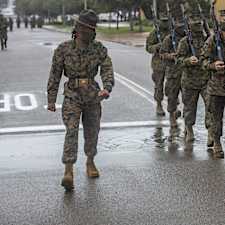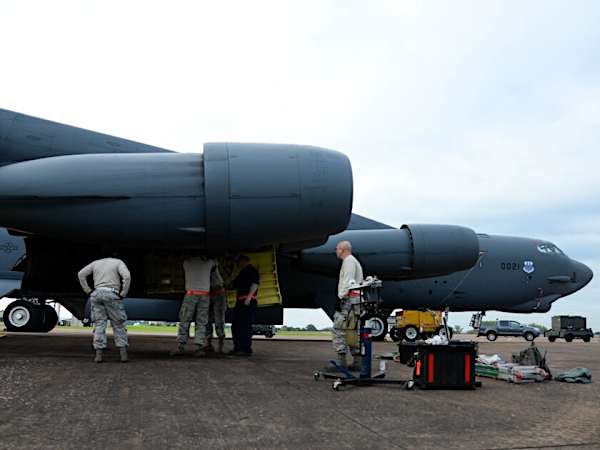爱吱声
标题: 俄羅斯核反擊第一條件 [打印本页]
作者: indy 时间: 2020-8-14 21:00
标题: 俄羅斯核反擊第一條件
根據今年8月7日俄羅斯國防部公布的
《俄羅斯核反擊第一條件》
如果俄羅斯本土以及盟國,收到到美國彈道導彈攻擊的信號,則俄羅斯將不論其彈頭是否為常規或核彈頭,一律以核武器進行反擊。
作者: indy 时间: 2020-8-14 21:00
https://www.militarytimes.com/ne ... missile-as-nuclear/
作者: indy 时间: 2020-8-15 00:40
indy 发表于 2020-8-14 08:00
https://www.militarytimes.com/news/your-military/2020/08/09/russia-warns-it-will-see-any-incoming-mi ...
[backcolor=var(--site-color)][size=1em]
[backcolor=var(--site-color)]
Your MilitaryRussia warns it will see any incoming missile as nuclear
[size=1em][color=var(--atype-theme-primary, #4f4a7a)]Vladimir Isachenkov, The Associated Press
[color=var(--atype-theme-grey-800)]4 days ago
/cloudfront-us-east-1.images.arcpublishing.com/mco/WDEJKBNSLVA5FODRPMTNIT372M.jpg) Russian Army RS-24 Yars ballistic missile makes its way through the Red Square during the Victory Day military parade marking the 75th anniversary of the Nazi defeat in WWII, in Moscow on June 24, 2020. (Pavel Golovkin/Pool via AP)
Russian Army RS-24 Yars ballistic missile makes its way through the Red Square during the Victory Day military parade marking the 75th anniversary of the Nazi defeat in WWII, in Moscow on June 24, 2020. (Pavel Golovkin/Pool via AP)
[size=1em]MOSCOW — Russia will perceive any ballistic missile launched at its territory as a nuclear attack that warrants a nuclear retaliation, the military warned in an article published Friday.
[size=1em]The harsh warning in the official military newspaper Krasnaya Zvezda (Red Star) is directed at the United States, which has worked to develop long-range non-nuclear weapons.
[size=1em]The article follows the publication in June of Russia’s nuclear deterrent policy that envisages the use of atomic weapons in response to what could be a conventional strike targeting the nation’s critical government and military infrastructure.
[backcolor=var(--atype-theme-grey-100)]/cloudfront-us-east-1.images.arcpublishing.com/mco/WVCYCBLZJJC6RDOZ2Y3OFQ5GOU.jpg) New Russian policy allows use of atomic weapons against non-nuclear strike
New Russian policy allows use of atomic weapons against non-nuclear strike[size=0.833em]President Vladimir Putin on Tuesday endorsed Russia’s nuclear deterrent policy, which allows him to use atomic weapons in response to a conventional strike targeting the nation’s critical government and military infrastructure.
[color=var(--atype-theme-grey-800)][color=var(--atype-theme-grey-800)]Vladimir Isachenkov, The Associated Press
[size=1em]In the Krasnaya Zvezda article, senior officers of the Russian military’s General Staff, Maj. Gen. Andrei Sterlin and Col. Alexander Khryapin, noted that there will be no way to determine if an incoming ballistic missile is fitted with a nuclear or a conventional warhead, and so the military will see it as a nuclear attack.
[size=1em]“Any attacking missile will be perceived as carrying a nuclear warhead,” the article said. “The information about the missile launch will be automatically relayed to the Russian military-political leadership, which will determine the scope of retaliatory action by nuclear forces depending on the evolving situation.”
/cloudfront-us-east-1.images.arcpublishing.com/mco/E3MWSUDPLNH6HE46KFLRTNQTSY.jpg) In this photo taken from undated footage distributed by Russian Defense Ministry Press Service, an intercontinental ballistic missile lifts off from a truck-mounted launcher somewhere in Russia. (Russian Defense Ministry Press Service via AP)
In this photo taken from undated footage distributed by Russian Defense Ministry Press Service, an intercontinental ballistic missile lifts off from a truck-mounted launcher somewhere in Russia. (Russian Defense Ministry Press Service via AP)[size=1em]The argument reflects Russia’s longtime concerns about the development of weapons that could give Washington the capability to knock out key military assets and government facilities without resorting to atomic weapons.
[backcolor=var(--atype-theme-grey-50)]Sign up for the Early Bird Brief[size=0.833em]Get the military's most comprehensive news and information every morning
(please select a country) United States United Kingdom Afghanistan Albania Algeria American Samoa Andorra Angola Anguilla Antarctica Antigua and Barbuda Argentina Armenia Aruba Australia Austria Azerbaijan Bahamas Bahrain Bangladesh Barbados Belarus Belgium Belize Benin Bermuda Bhutan Bolivia Bosnia and Herzegovina Botswana Bouvet Island Brazil British Indian Ocean Territory Brunei Darussalam Bulgaria Burkina Faso Burundi Cambodia Cameroon Canada Cape Verde Cayman Islands Central African Republic Chad Chile China Christmas Island Cocos (Keeling) Islands Colombia Comoros Congo Congo, The Democratic Republic of The Cook Islands Costa Rica Cote D'ivoire Croatia Cuba Cyprus Czech Republic Denmark Djibouti Dominica Dominican Republic Ecuador Egypt El Salvador Equatorial Guinea Eritrea Estonia Ethiopia Falkland Islands (Malvinas) Faroe Islands Fiji Finland France French Guiana French Polynesia French Southern Territories Gabon Gambia Georgia Germany Ghana Gibraltar Greece Greenland Grenada Guadeloupe Guam Guatemala Guinea Guinea-bissau Guyana Haiti Heard Island and Mcdonald Islands Holy See (Vatican City State) Honduras Hong Kong Hungary Iceland India Indonesia Iran, Islamic Republic of Iraq Ireland Israel Italy Jamaica Japan Jordan Kazakhstan Kenya Kiribati Korea, Democratic People's Republic of Korea, Republic of Kuwait Kyrgyzstan Lao People's Democratic Republic Latvia Lebanon Lesotho Liberia Libyan Arab Jamahiriya Liechtenstein Lithuania Luxembourg Macao Macedonia, The Former Yugoslav Republic of Madagascar Malawi Malaysia Maldives Mali Malta Marshall Islands Martinique Mauritania Mauritius Mayotte Mexico Micronesia, Federated States of Moldova, Republic of Monaco Mongolia Montserrat Morocco Mozambique Myanmar Namibia Nauru Nepal Netherlands Netherlands Antilles New Caledonia New Zealand Nicaragua Niger Nigeria Niue Norfolk Island Northern Mariana Islands Norway Oman Pakistan Palau Palestinian Territory, Occupied Panama Papua New Guinea Paraguay Peru Philippines Pitcairn Poland Portugal Puerto Rico Qatar Reunion Romania Russian Federation Rwanda Saint Helena Saint Kitts and Nevis Saint Lucia Saint Pierre and Miquelon Saint Vincent and The Grenadines Samoa San Marino Sao Tome and Principe Saudi Arabia Senegal Serbia and Montenegro Seychelles Sierra Leone Singapore Slovakia Slovenia Solomon Islands Somalia South Africa South Georgia and The South Sandwich Islands Spain Sri Lanka Sudan Suriname Svalbard and Jan Mayen Swaziland Sweden Switzerland Syrian Arab Republic Taiwan, Province of China Tajikistan Tanzania, United Republic of Thailand Timor-leste Togo Tokelau Tonga Trinidad and Tobago Tunisia Turkey Turkmenistan Turks and Caicos Islands Tuvalu Uganda Ukraine United Arab Emirates United Kingdom United States United States Minor Outlying Islands Uruguay Uzbekistan Vanuatu Venezuela Viet Nam Virgin Islands, British Virgin Islands, U.S. Wallis and Futuna Western Sahara Yemen Zambia Zimbabwe
Subscribe
[size=1em]In line with Russian military doctrine, the new nuclear deterrent policy reaffirmed that the country could use nuclear weapons in response to a nuclear attack or an aggression involving conventional weapons that “threatens the very existence of the state.”
[size=1em]The policy document offered a detailed description of situations that could trigger the use of nuclear weapons, including the use of nuclear weapons or other weapons of mass destruction against Russia or its allies.
[size=1em]In addition to that, the document states for the first time that Russia could use its nuclear arsenal if it receives “reliable information” about the launch of ballistic missiles targeting its territory or its allies and also in the case of “enemy impact on critically important government or military facilities of the Russian Federation, the incapacitation of which could result in the failure of retaliatory action of nuclear forces.”
 Russian RS-24 Yars ballistic missiles roll in Red Square during the Victory Day military parade marking the 75th anniversary of the Nazi defeat in Moscow on June 24, 2020. (Alexander Zemlianichenko/AP)
Russian RS-24 Yars ballistic missiles roll in Red Square during the Victory Day military parade marking the 75th anniversary of the Nazi defeat in Moscow on June 24, 2020. (Alexander Zemlianichenko/AP)[size=1em]U.S.-Russia relations are at post-Cold War lows over the Ukrainian crisis, the accusations of Russian meddling in the U.S. 2016 presidential election and other differences.
[size=1em]Russian officials have cast the U.S.-led missile defense program and its plans to put weapons in orbit as a top threat, arguing that the new capability could tempt Washington to strike Russia with impunity in the hope of fending off a retaliatory strike.
[backcolor=var(--atype-theme-grey-100)] Russia’s new nuclear policy could be a path to arms control treaties
Russia’s new nuclear policy could be a path to arms control treaties[size=0.833em]The document offers a valuable window into Russia’s strengths and vulnerabilities as they appear from Moscow.
[color=var(--atype-theme-grey-800)][color=var(--atype-theme-grey-800)]Sarah Bidgood
[size=1em]The Krasnaya Zvezda article emphasized that the publication of the new nuclear deterrent policy was intended to unambiguously explain what Russia sees as aggression.
[size=1em]“Russia has designated the ‘red lines’ that we don’t advise anyone to cross,” it said. “If a potential adversary dares to do that, the answer will undoubtedly be devastating. The specifics of retaliatory action, such as where, when and how much will be determined by Russia’s military-political leadership depending on the situation.”
Recommended For You
Around The Web

 Spain deploys men in deep V-necks and leather suspenders to stave off Covid-19Military Times
Spain deploys men in deep V-necks and leather suspenders to stave off Covid-19Military Times

 How the Army officer who testified against Trump could end up in a court-martialMilitary Times
How the Army officer who testified against Trump could end up in a court-martialMilitary Times

 Coronavirus survivors banned from joining the militaryMilitary Times
Coronavirus survivors banned from joining the militaryMilitary Times

 Uncomfortable gazes: Why some sailors are unhappy with the design of the new woodland cammiesMilitary Times
Uncomfortable gazes: Why some sailors are unhappy with the design of the new woodland cammiesMilitary Times

 Here’s how the Air Force wants to re-engine B-52 bombersMilitary Times
Here’s how the Air Force wants to re-engine B-52 bombersMilitary Times
Comments
[backcolor=var(--atype-theme-grey-50, #eee)]Most Watched Videos
The lost AAV is found, uniform changes, and want to buy a missile silo? - The Briefing 08.11.20[size=0.833em]A hard look at the the story of the Marine amphibious assault vehicle recently lost in a training exercise, the Air Force sees changes to the mess dress uniform, and Airmen in South Korea want to help you adjust to the new normal by being S.I.C.K. Also - anyone want to buy a Cold War-era missile silo? All that and more on The Briefing for Aug. 11, 2020.
/d2nzl2jt8r9iyg.cloudfront.net/08-09-2020/t_2361b4c12f714581945c063afbd16ad4_name_44862801001_4797387730001_video_still_for_video_4797222686001.jpg) Defense News Money Minute: Mortgage Pre-Approval[size=0.833em]
Defense News Money Minute: Mortgage Pre-Approval[size=0.833em]
/d2nzl2jt8r9iyg.cloudfront.net/08-06-2020/t_f23848b76e1b450abe97c9818477a097_name_Atomic_bomb_anniv.jpg) The world-shaking explosions of the atomic bomb - A look back[size=0.833em]
The world-shaking explosions of the atomic bomb - A look back[size=0.833em]
/d2nzl2jt8r9iyg.cloudfront.net/08-04-2020/t_72b67d6e64cb45b89c1108a783baf002_name_Unclassified_101_THUMB_v4.jpg) Unclassified: The Navy's 1960s dating advice[size=0.833em]
Unclassified: The Navy's 1960s dating advice[size=0.833em]
Top Headlines
[backcolor=var(--atype-theme-primary, #ccc)][size=1em]
[size=1em]


- https://www.militarytimes.com © 2020 Sightline Media Group
Not A U.S. Government Publication
Terms of Use
Get Us
Contact Us
About Us
| 欢迎光临 爱吱声 (http://129.226.69.186/bbs/) |
Powered by Discuz! X3.2 |
/cloudfront-us-east-1.images.arcpublishing.com/mco/WDEJKBNSLVA5FODRPMTNIT372M.jpg) Russian Army RS-24 Yars ballistic missile makes its way through the Red Square during the Victory Day military parade marking the 75th anniversary of the Nazi defeat in WWII, in Moscow on June 24, 2020. (Pavel Golovkin/Pool via AP)
Russian Army RS-24 Yars ballistic missile makes its way through the Red Square during the Victory Day military parade marking the 75th anniversary of the Nazi defeat in WWII, in Moscow on June 24, 2020. (Pavel Golovkin/Pool via AP)/cloudfront-us-east-1.images.arcpublishing.com/mco/WVCYCBLZJJC6RDOZ2Y3OFQ5GOU.jpg) New Russian policy allows use of atomic weapons against non-nuclear strike
New Russian policy allows use of atomic weapons against non-nuclear strike/cloudfront-us-east-1.images.arcpublishing.com/mco/E3MWSUDPLNH6HE46KFLRTNQTSY.jpg) In this photo taken from undated footage distributed by Russian Defense Ministry Press Service, an intercontinental ballistic missile lifts off from a truck-mounted launcher somewhere in Russia. (Russian Defense Ministry Press Service via AP)
In this photo taken from undated footage distributed by Russian Defense Ministry Press Service, an intercontinental ballistic missile lifts off from a truck-mounted launcher somewhere in Russia. (Russian Defense Ministry Press Service via AP)




/d2nzl2jt8r9iyg.cloudfront.net/08-09-2020/t_2361b4c12f714581945c063afbd16ad4_name_44862801001_4797387730001_video_still_for_video_4797222686001.jpg) Defense News Money Minute: Mortgage Pre-Approval[size=0.833em]
Defense News Money Minute: Mortgage Pre-Approval[size=0.833em]/d2nzl2jt8r9iyg.cloudfront.net/08-06-2020/t_f23848b76e1b450abe97c9818477a097_name_Atomic_bomb_anniv.jpg) The world-shaking explosions of the atomic bomb - A look back[size=0.833em]
The world-shaking explosions of the atomic bomb - A look back[size=0.833em]/d2nzl2jt8r9iyg.cloudfront.net/08-04-2020/t_72b67d6e64cb45b89c1108a783baf002_name_Unclassified_101_THUMB_v4.jpg) Unclassified: The Navy's 1960s dating advice[size=0.833em]
Unclassified: The Navy's 1960s dating advice[size=0.833em]